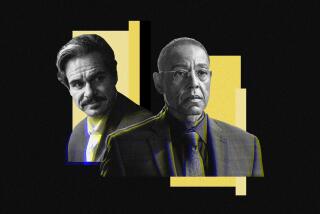Quattrone Jury Gets Case After Last Jabs by Prosecutors
Prosecutors gave forceful closing arguments Friday in Frank Quattrone’s obstruction-of-justice retrial, saying the former Silicon Valley investment banker tried to derail government probes because they threatened his lucrative career financing technology companies.
Quattrone’s defense lawyer countered with a humor-sprinkled attack on the government’s case -- at one point showing a picture of a red herring on a large-screen monitor to contend that prosecutors were using deceptive logic.
Jurors were given the case late Friday afternoon and deliberated about three hours before adjourning for the weekend. In one note to the judge, jurors asked whether “the lack of any other charges against Frank Quattrone at this trial” could be used in weighing whether he had a motive to commit obstruction.
The question was an apparent reference to the fact that the three counts against Quattrone -- two of obstruction and one of witness tampering -- are based on the former banker’s alleged attempt to undermine a government investigation into how initial public offerings of stock were allocated. He was not charged with wrongdoing in the IPO allocation process itself.
The closing arguments by Assistant U.S. Attys. David Anders and Steven Peikin touched on many of the same points as in Quattrone’s first trial in October, which ended in a jury split 8 to 3 in favor of conviction. But it was a tighter argument this time, with Anders recounting how the investigations steadily escalated -- and how Quattrone may have grown increasingly fearful of them.
The charges against Quattrone, 48, stem from a brief e-mail he wrote to his staff at Credit Suisse First Boston on Dec. 5, 2000. The missive endorsed another banker’s suggestion that Quattrone’s team purge certain documents from its files.
The government alleges that the e-mail was a carefully considered attempt to impede probes into how CSFB handed out lucrative IPOs. Quattrone wrote the e-mail two days after being told of a grand jury investigation and hours after being advised to hire his own lawyer.
Quattrone contends that he dashed off the e-mail along with a flurry of others before he rushed home for the day, and that he didn’t have the probes in mind when writing it. In his closing, Anders reminded jurors that Quattrone earned $120 million in 2000 alone and said the outsized compensation was essential to understanding why the former banker had a reason to impede investigators.
“This case is not about how much money Frank Quattrone made,” Anders said. “There’s nothing wrong with that, of course. But what’s wrong is breaking the law so you can stay on top.”
In his summation, defense attorney John Keker belittled the government’s case and urged jurors not to convict unless they were completely certain of Quattrone’s guilt. A juror who is not 100% sure that Quattrone is guilty must vote acquittal, he said.
Keker said jurors would have to be “brain surgeons” to be able to find that Quattrone had criminal intent.
After deliberations began, jurors asked for a list of other e-mails that Quattrone had sent at about the same time. Defense attorneys introduced the list into evidence to show the flurry of e-mails that Quattrone was sending to colleagues at the time.
More to Read
Start your day right
Sign up for Essential California for news, features and recommendations from the L.A. Times and beyond in your inbox six days a week.
You may occasionally receive promotional content from the Los Angeles Times.






